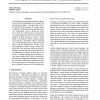Free Online Productivity Tools
i2Speak
i2Symbol
i2OCR
iTex2Img
iWeb2Print
iWeb2Shot
i2Type
iPdf2Split
iPdf2Merge
i2Bopomofo
i2Arabic
i2Style
i2Image
i2PDF
iLatex2Rtf
Sci2ools
113
Voted
ICML
2001
IEEE
2001
IEEE
Convergence of Gradient Dynamics with a Variable Learning Rate
As multiagent environments become more prevalent we need to understand how this changes the agent-based paradigm. One aspect that is heavily affected by the presence of multiple agents is learning. Traditional learning algorithms have core assumptions, such as Markovian transitions, which are violated in these environments. Yet, understanding the behavior of learning algorithms in these domains is critical. Singh, Kearns, and Mansour (2000) examine gradient ascent learning, specifically within a restricted class of repeated matrix games. They prove that when using this technique the average of expected payoffs over time converges. On the other hand, they also show that neither the players' strategies nor their expected payoffs themselves are guaranteed to converge. In this paper we introduce a variable learning rate for gradient ascent, along with the WoLF ("Win or Learn Fast") principle for regulating the learning rate. We then prove that this modification to gradient ...
Gradient Ascent Learning | ICML 2001 | Machine Learning | Traditional Learning Algorithms | Variable Learning Rate |
Related Content
| Added | 17 Nov 2009 |
| Updated | 17 Nov 2009 |
| Type | Conference |
| Year | 2001 |
| Where | ICML |
| Authors | Michael H. Bowling, Manuela M. Veloso |
Comments (0)

